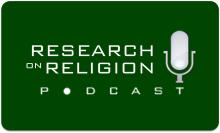UW Political Science Professor Tony Gill is the host of “Research on Religion,” a weekly podcast series devoted to the social scientific study of religion. On March 13th, 2016, Prof. Gill hosted the 280th episode of the podcast series, which he initially started in the fall of 2009. George Mason University’s Russ Roberts’ podcast EconTalk served as an inspiration for “Research on Religion.” The goal of the podcast series is to make scholarly research on religion interesting, relevant and accessible as well as to understand how religion, religious institutions and spiritual individuals operate in the temporal world. In addition to featuring academic research, the podcast highlights the insights of practitioners, who are involved in the day-to-day operation of religious organizations. Over the years, “Research on Religion” has addressed a broad variety of topics, such as Christmas traditions, witch trials and human sacrifice, just war theory, quantum physics and the God particle, as well as the poetry of heaven and hell to name just a few.
In the series’ 280th episode, Prof. Gill welcomed Economics Ph.D. candidate Nathaniel Snow from George Mason University to discuss the Evangelical Coalition in conjunction with public choice. For his dissertation, Snow utilizes the analytical tools of public choice theory to study the history of the Evangelical Coalition and to understand the organizational role that religion can play in political life. The central questions, Snow seeks to address are: How have evangelical Christians organized themselves over time to express their political and social views? And has this coalition remained stable over time, or has it changed? After discussing Snow’s background, the two elaborate on public choice theory—a subfield of economics that applies the analytical tools of micro-economics to the world of politics, imposing the assumptions of methodological individualism, analytical egalitarianism, and self-interest onto the actions and decisions of people in the political realm. Following the theoretical introduction, they turn to religion. Snow notes that it is difficult to clearly define what it means to be evangelical—a point that alludes to the changing and chaotic nature of the “evangelical voting bloc.” He illustrates this point by discussing the role of the Evangelical Coalition as a voting bloc in various elections from the 1928 presidential election to the current presidential election.
The “Research on Religion” podcast series is sponsored by the Baylor Institute for Studies of Religion (ISR).
